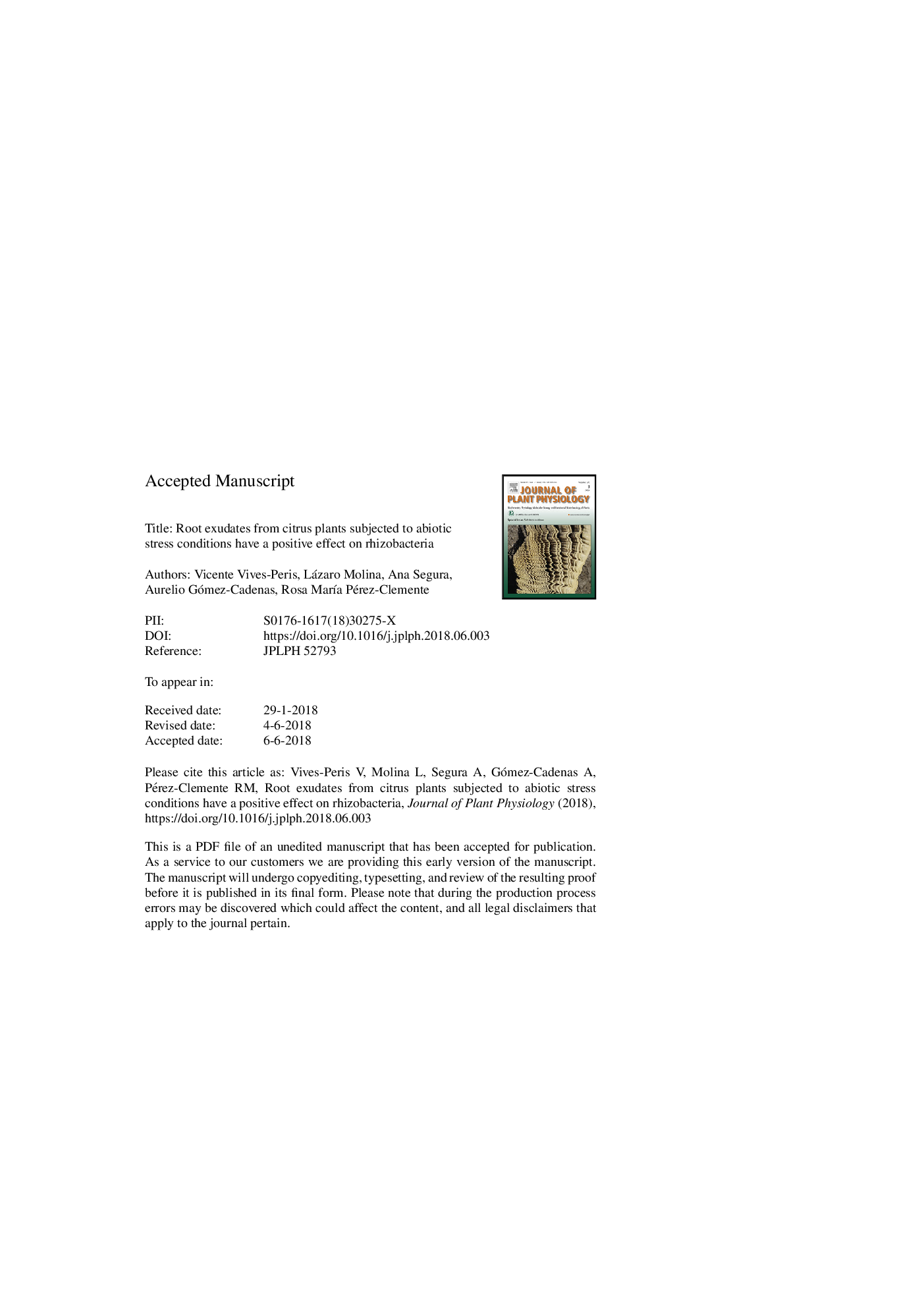| کد مقاله | کد نشریه | سال انتشار | مقاله انگلیسی | نسخه تمام متن |
|---|---|---|---|---|
| 8386718 | 1543851 | 2018 | 29 صفحه PDF | دانلود رایگان |
عنوان انگلیسی مقاله ISI
Root exudates from citrus plants subjected to abiotic stress conditions have a positive effect on rhizobacteria
ترجمه فارسی عنوان
ریشه زایی از گیاهان مرکبات تحت شرایط تنش زایشی اثر مثبتی بر روی ریزوباکتریها دارد
دانلود مقاله + سفارش ترجمه
دانلود مقاله ISI انگلیسی
رایگان برای ایرانیان
کلمات کلیدی
ACCCFUONPGHuanglongbingHLBPGPRaminocyclopropane-1-carboxylic acid - آمینوسیکلپروپان-1-کربوکسیلیک اسیدHeat stress - استرس گرماییSalicylic acid - اسید سالیسیلیکortho-nitrophenyl-β-galactoside - اورات نیترو فنیل بتا گالاکتوزیدTetracycline - تتراسایکلینSalt stress - تنش شوریPlant growth promoting rhizobacteria - رشد گیاهی رشد ریزوباکتریومRhizobacteria - ریزوباکتریومRoot exudates - ریشه exudatesRifampicin - ریفامپینArbuscular mycorrhizal fungi - قارچ های میکوریزا آربوسکولارCitrus - مرکباتcolony forming units - واحدهای تشکیل دهنده کلنیRif - کد عکسChloramphenicol - کلرامفنیکل
موضوعات مرتبط
علوم زیستی و بیوفناوری
علوم کشاورزی و بیولوژیک
علوم زراعت و اصلاح نباتات
چکیده انگلیسی
Plants are constantly releasing root exudates to the rhizosphere. These compounds are responsible for different (positive or negative) interactions with other organisms, including plants, fungi or bacteria. In this work, the effect of root exudates obtained from in vitro cultured citrus plants on two rhizobacteria (Pseudomonas putida KT2440 and Novosphingobium sp. HR1a) was evaluated. Root exudates were obtained from two citrus genotypes differing in their sensitivity to salt and heat stress and differentially affected the growth of both rhizobacteria. Root exudates from salt-stressed plants of C. macrophylla (salt tolerant) induced an increase in bacterial growth higher than that obtained from Carrizo citrange exudates (salt sensitive). Root exudates from heat-stressed plants also had a positive effect on bacterial growth, which was more evident in the heat-sensitive C. macrophylla. These results reveal that the growth of these rhizobacteria can be modulated through citrus root exudates and can change depending on both the stress conditions as well as the genotype. Biosensors P. putida KT2442 (pMIS5) and Novosphingobium sp. HR1a (pPAH) were used to test the presence of proline and salicylates in root exudates by measuring β-galactosidase activity. This activity increased in the presence of root exudates obtained from stressed plants to a higher extent in the case of exudates obtained from the genotype resistant to each particular stress, indicating that those root exudates contain larger quantities of proline and salicylates, as it has been described previously. Our data reveals that both P. putida KT2442 (pMIS5) and Novosphingobium sp. HR1a (pPAH), could be used as biosensors of plant stress.
ناشر
Database: Elsevier - ScienceDirect (ساینس دایرکت)
Journal: Journal of Plant Physiology - Volume 228, September 2018, Pages 208-217
Journal: Journal of Plant Physiology - Volume 228, September 2018, Pages 208-217
نویسندگان
Vicente Vives-Peris, Lázaro Molina, Ana Segura, Aurelio Gómez-Cadenas, Rosa MarÃa Pérez-Clemente,
